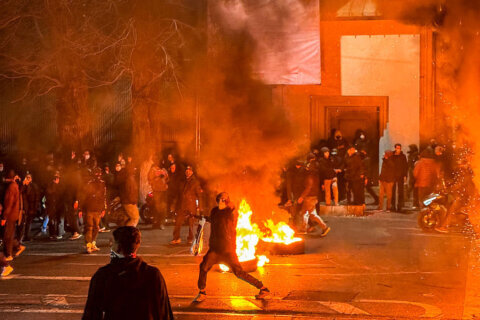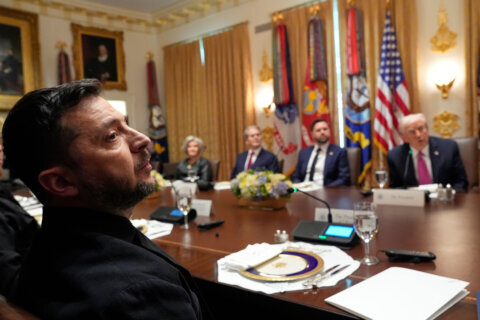WASHINGTON — Mullah Omar, the powerful, yet reclusive leader of Afghanistan’s Taliban, died in Karachi, Pakistan years ago under mysterious circumstances, an Afghan government official tells WTOP.
“We can confirm, based on credible information, that he died in 2013,” says the official, who spoke on the condition of anonymity because he did not have permission to speak publicly.
The news amounts to an intelligence bombshell akin to the CIA discovery that al-Qaida leader Osama Bin Laden had been living in Pakistan before his killing in 2011.
Longtime Afghan journalist and regional security expert Rahimullah Yusufzai — who knew Omar — told WTOP, “I cannot confirm his death, but I believe it.”
The latest report of his death — one of many in the last decade — seemed to catch U.S. officials off guard.
“We are aware of reports of the death of Mullah Omar,” Eric Schultz, White House principal deputy press secretary, said during Wednesday’s White House briefing. “Without commenting on the specifics of these reports, we do believe these reports are credible.”
The gravity of the situation was magnified by news that Afghan intelligence officials briefed Afghan President Ashraf Ghani about their finding. The snap briefing suggested that Afghan officials were not previously aware of Omar’s death. It’s not clear how they found out.
But in a telling development, the Afghan official who WTOP spoke with expressed anger toward the Pakistani government over circumstances of the announcement. The official suggested the news was being used to manipulate the Afghan peace talks.
But there are questions from inside Pakistan as well. “It’s impossible for Mullah Omar to be treated in a Karachi hospital and to eventually pass away there, without the authorities knowing and if anything, facilitating it,” said Rashed Rahman, a terrorism expert and editor of Pakistan Daily Times.
“The Karachi part of the story seems credible,” Rahman said, “because we’re also hearing in the aftermath of the breaking of this news of a succession struggle going on inside the Taliban.”
Among the candidates to succeed him is Omar’s son — Mulla Mohammad Yaqub, 26 — who recently graduated from a madrassa in Karachi, Rahman said.
Omar was long believed to be in Pakistan, but Rahman said his whereabouts were unclear.
“We know that after the 2001 invasion and occupation in Afghanistan by the U.S., later backed by NATO, that the Taliban fled into Pakistan territory,” Rahman continued. “For many years, we were hearing that Mullah Omar and his Shura council were based in and around Quetta and Baluchistan, but no one was ever able to trace them out.”
WTOP contacted Pakistani authorities about Omar’s death and circumstances, but have not received a response.
Pakistan was heavily invested in peace talks between the Afghan government and the Taliban, Syed Tariq Fatemi, special assistant to Pakistan’s prime minister, told reporters in Washington last week.
“We are doing it to assist the Afghan objective of reconciliation, but we are very firm in our view that we will only play a supporting role,” Fatemi said.
That characterization is being questioned in light of the news of Omar’s death.
Pakistan hosted the first round of peace talks on July 7 and is scheduled to facilitate the next round slated to begin on July 31.
The news of Omar’s death has injected more confusion and fears of duplicity into an already complex situation in the region. Just weeks ago, Omar reportedly released a statement signaling his approval of the talks.
Still, Rahman has expressed skepticism about the statement.
“Two weeks ago, his statement came endorsing the talks, quoting religious principles to justify it,” Rahman recalled. “But was he speaking from the grave or was someone using his name to lend the statement legitimacy?”
The development has raised the question of just how well U.S., Afghan and Pakistani intelligence are communicating.
“The intelligence community is looking at these reports and continues to assess the circumstances around his death,” Schultz says. “But beyond that, I’m not going to be in a position to speak candidly about what we know at this point.”








